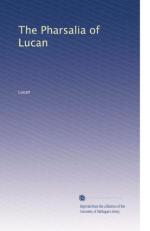|
This section contains 281 words (approx. 1 page at 400 words per page) |

|
The Pharsalia Summary & Study Guide Description
The Pharsalia Summary & Study Guide includes comprehensive information and analysis to help you understand the book. This study guide contains the following sections:
This detailed literature summary also contains Bibliography on The Pharsalia by Lucan.
The Pharsalia has been described by Ahl as "a political act as well as a political poem." Written when Nero's true nature could no longer be denied, it is a harrowing portrait of the disintegration of Rome, civil war, and the triumph of a single will. Lucan's unfinished epic was a subject of criticism even as he wrote it. In Petronius's Satyricon, a bitterly satiric novel written by another victim of Nero, a character complains that it is not a true epic, but a history, because it did not incorporate divine motivation. Even more important to later readings of the poem was the historian Tacitus's negative portrait of the poet in the Annales. From that day to this, Lucan has suffered from Tacitus's portrait and confusion about his approach.
Lucan's ability to paint the terrifying and the unearthly and to produce a pithy quotable line has not endeared him to all critics, but he has never lacked readers. The only copy of a secular poem copied between 550-750 A.D. that survives is a fragment entitled Pharsalia. His partisan portraits of Cato, Brutus, and Marcia made them models for medieval clerics and eighteenth century revolutionaries. His treatment of the witch Erictho and her necromancy made a fundamental impression on the western mind. Lucan's influence surfaces in the narratives of witch trials as well as in horror literature. Despite Lucan's references to fate, his use of human will as the source of action and events, rather than divine, is more immediately understandable to modern readers. His vision of dismembered bodies and fractured boundaries holds a mirror up to a century that has descended more than once into horror and chaos.
Read more from the Study Guide
|
This section contains 281 words (approx. 1 page at 400 words per page) |

|



